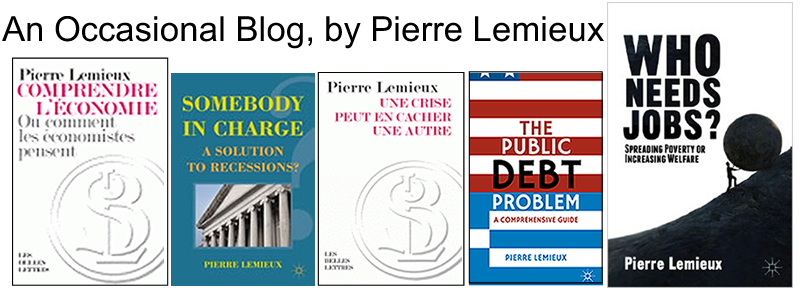Numerous press reports (see, for example, the Wall Street Journal and the Financial Times) describe shortages of gasoline in New York City. These are real shortages, that is, waiting lines to obtain insufficient supplies. Economics teaches that prices would rise until quantity demanded decreases (and, with a lag, until quantity supplied increases), thus clearing the market and eliminating the shortage. Only temporary high prices would remain, and at those prices, anybody could get as much gasoline as one wants. Why is this mechanism not working? Continue reading
Category Archives: Blog posts
À toutes les gloires de l’autorité
(Publié dans Le Devoir [Montréal], 18 septembre 2012)
Le plaidoyer d’Yves Rabeau dans Le Devoir du 10 septembre exprime aussi bien que faire se peut les arguments pour interdire l’acquisition d’Astral par Bell. Tous les économistes ne les partagent pas. Loin de là. Continue reading
The Greeks Are Learning the Hard Way, If They Learn
On the one hand, we can understand why Greeks do not to want to pay for the false and self-serving promises of the politicians and bureaucrats who brought the country into its current predicaments. So repudiation of the state’s debt may be the least costly solution, at least for ordinary people. Continue reading
The “War on Drugs” and the Defenders of Our Liberties
This is the most revolting video I have seen. Heads should fall, quasi literally — that is, criminal prosecutions should be launched — or perhaps literally full stop. And the indecent “war on drugs”, which is a war on the people, should be aborted immediately. Give Leviathan an inch, he will take a mile.
Obamix or Romnex?
Read my latest La Tribune column: “Qui sera porté sur le bouclier, Obamix ou Romnex?”
An Industrialized Minister Here, an Industrialized Bureaucrat There
http://www.ft.com/intl/cms/s/0/4e0a21fc-2261-11e1-acdc-00144feabdc0.html#axzz1unqREWIh
The Financial Times is one of the best economic and financial newspapers in the world. It is also a good mirror of the conventional wisdom about the economy and the state.
On December 11, 2011, the newspaper ran a story on the growing public debt crisis in Europe. “Markets and governments”, the journalist argued, “face an uphill struggle … as new figures reveal that the borrowing of industrialised governments has surged”. The story cited an OECD official commenting that “market events seem to reflect situations whereby animal spirits dominate market dynamics, thereby pushing up sovereign borrowing rates with serious consequences for the sustainability of sovereign debt.” Continue reading
A “Bold Vision” for “We” “As A Country”
http://business.financialpost.com/2012/04/16/caw-demands-new-bold-vision-for-canadas-auto-industry/
The new “bold vision” the Canadian Auto Workers union is pushing means just one thing: they want the money, other people’s money, for themselves.
The push is disguised under the political “we”. Economic analysis (both social choice and public choice theories) show that the “we as a country” has no ascertainable meaning, except dictatorial: those who utter it want their preferences to be imposed to others.
For a summary of relevant theories, see my “The Public Choice Revolution”, Regulation 27:3 (2004).
Many Jean Valjeans in Today’s Society
Today, I saw the 25th-anniversary production of Les Misérables, the musical done after Victor Hugo’s famous 1862 novel. The musical is well worth seeing, and the original work well worth reading. In fact, to see the musical at the Boston Opera House, it was even worth traveling to Massachusetts, which I normally try to avoid like plague.
Contrary to what most people think, there are many Jean Valjeans in today’s society, and paradoxically as many, if not more, in America than in most civilized countries. They are the people who have been convicted of victimless, state-manufactured crimes, and whose whole life is destroyed by their criminal records. The yellow passport they carry is much stickier than Jean Valjean’s, for it stored in government computers and accessible by an army of little Javerts.
Imposer son royaume aux autres…
Je retrouve dans Le hasard et la nécessité (Paris, Seuil, 1970) de Jacques Monod l’étonnant simplisme et l’incroyable naïveté qui caractérisaient la philosophie socialiste régnante au 20e siècle. Les années soixante et soixante-dix en ont peut-être marqué la tragique cristallisation, pour ne pas dire fossilisation. Monod écrit:
L’éthique de la connaissance enfin est à mes yeux la seule attitude à la fois rationnelle et délibérément idéaliste sur quoi pourrait être édifié un véritable socialisme. […] Acceptée comme base des institutions sociales et politiques, donc comme mesure de leur autenthicité, de leur valeur, seule l’éthique de la connaissance pourrait conduire au socialisme. Elle impose des institutions vouées à la défense, à l’extension, à l’enrichissement du Royaume transcendant des idées, de la connaissance, de la création.
Sautez quelques lignes jusqu’aux derniers mots du livre :
L’homme sait enfin qu’il est seul dans l’immensité indifférente de l’Univers d’où il a émergé par hasard. Non plus que son destin, son devoir n’est écrit nulle part. À lui de choisir entre le Royaume et les ténèbres.
Pas un doute sur l’existence d’une sorte d’homme aggloméré qui « choisit » pour lui-même, c’est-à-dire qui choisit pour les autres et leur impose ses choix. Il est vrai que la théorie des choix sociaux (Arrow et al.) était toute neuve et que la théorie économique du bien-être n’avait que quelques décennies, mais, quand même, quelle ignorance, quelle vanité pour quelqu’un qui se prétendait scientifique!
The American States’ Debt Crisis of the 1840s
“Meanwhile the foreign bankers were endeavoring to safeguard as best they could the interests of their clients. Before Mississippi repudiated a memorial was drafted by the Rothschilds. A copy was presented to Lord Palmerston, the British foreign secretary, requesting that it be presented through the medium of His Majesty’s minister at Washington. Lord Palmerston curtly refused to do, this on the ground that ‘British subjects who buy foreign securities do so at their own risk and must abide the consequences’.” — Reginald C. McGrane (1933), “Some Aspects of American State Debts in the Forties”, American Historical Review 38:4 (July 1933), p. 682
